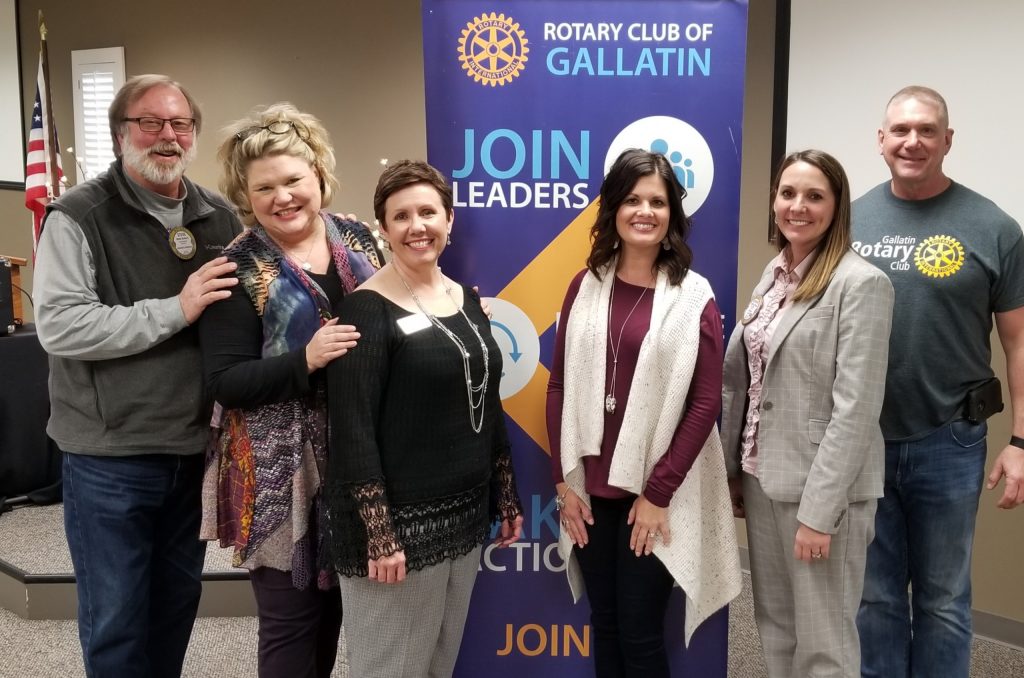Rotary hears from Council on Aging
Posted By Josh Nelson

The Gallatin Noon Rotary Club was fortunate to have Kayce Martin from the Council on Aging of Middle Tennessee as their speaker Thursday.
The Council on Aging (COA) was founded in 1985 through an initiative by then Nashville Mayor Richard Fulton’s office.
“What we do is look at unmet needs for older adults in our 13-county service area,” Martin said, “and then we match those needs and meet those needs with education and resources and advocacy and information.”
They have several aspects to their work.
“One of those which will be of particular interest to you revolves around senior transportation,” Martin said. “There were a lot of gaps in senior transportation, which leads to more health problems – the ripple effect is pretty great…out of that was born ‘Senior Ride Nashville.’ It’s now it’s own 501(c)3.
“What it is, is a volunteer ride program. They vet and have volunteer drivers…and they match that older adult with that driver.”
Martin said a few seconds later “it had sparked some interest in Sumner County and now there is a ‘Senior Ride Sumner’ coming.”
It will launch in May, one Rotary Club member said.
Martin also talked about their various publications.
“We’re best known for our ‘Directory of Services,'” Martin said. “This is the comprehensive guide for all senior resources in Middle Tennessee. It is updated every other year for older adults, their families, and caregivers. It is available at all public libraries; I also just dropped some off at The Salvus Center. Not only is it comprehensive and it’s free, but it has a lot of information that, quite frankly, is often hard to search online.
“Finding resources, while they may be plentiful, it’s kind of hard to sort through what you need; this book can help you do that. I think it’s even better than googling because sometimes you know what you need, but you don’t know what the call it or the word is…this book contains it in a very concise way.”
In addition to the aforementioned places to get the book, Martin said it is also available online through the COA’s website at www.coamidtn.org.
They also offer publications for planning the end of life and a separate one for caregivers: “There are things in there where you might say, ‘I didn’t think about that,'” Martin said,
And interestingly, they have a publication to guide grandparents through raising their grandchildren.
“We are now acutely aware that through the opioid crisis in this state, this is one of those things that is a ripple effect of that,” Martin said. “Because of addiction; because of incarceration; because of other issues that surround that…grandparents raising grandchildren is only one of them.
“It’s also a step-by-step guide to how to talk to a school system, what to consider with technology, what to be aware of – for a lot of grandparents, raising children is very, very different these days than when they were raising their own kids.”
Martin then transitioned to scams targeting the elderly.
“Scammers are getting really good at creating pieces of mail that look really legitimate,” she said. “It’s just a matter of time. What the scammers are doing is…it’s a numbers game. They’re going through everybody who is going to hang up the phone to get to that one person who is going to say, ‘Hello,’ and they’re going to chat on the phone.”
Martin said older people are sometimes susceptible to such scams because of loneliness.
“If you’re home alone all day long…that voice on the other end of the phone can be a welcome voice just because it is someone to talk with,” she said. “For those of you who know someone, check on them; check on them for a lot of reasons.
“And for those of you who have a business where you send out employees into homes for various reasons, please tell your employees to check on those older adults.”
Martin told the story of one older lady who lived alone and met a man who went to her house on the third of every month and collected her check and took her to the bank.
“She would deposit the check in the bank account, and then he would have all of her information – her bank account number, her routing number; everything to access her account,” Martin said. “He told her he was investing her money. He told her that he was paying her bills.
“Instead, she was coming (to a food bank) because her house was going to be foreclosed on…her electricity had been cut off for months…and the gentleman had taken out credit cards in her name…and stole her identity.”
Through the COA, the man was arrested and her electricity was restored and she was able to get her identity restored and get back on her feet.
That is not always the case: Martin said the elderly are much less likely to report being a victim of a scam than others.
“They’re afraid a lot of times that their independence will be taken away,” she said. “That is a real threat: ‘I won’t be allowed to live in my home anymore (or) they’re going to take the car keys away,’ so they are much more reluctant to report a crime.”
This is just a portion of what Ms. Martin said during her presentation. To listen to her full presentation, click on the link below. She was introduced by Rotarian Stephanie Harville.